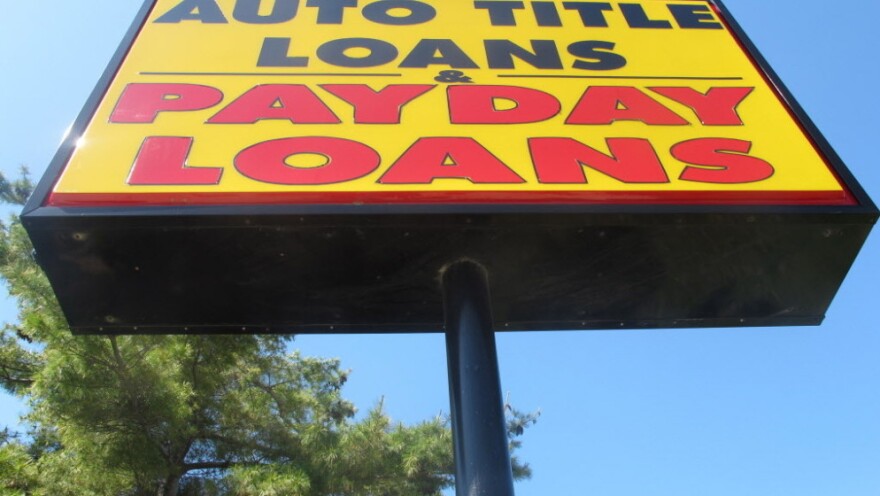In 2011, the city of Dallas regulated payday and auto title lenders, forcing them to register with the city and structure loans in a way that made them easier to pay back.
It was in response to an explosion of lenders offering small, short-term loans with very high fees to low-income people with poor credit, often triggering a spiral of debt.
Now, the city council has unanimously voted to expand regulations to include more types of high-cost, small-dollar loans, closing what council members have called a “loophole.”
At the meeting, council member Cara Mendelsohn said she attended a Dallas City Council meeting for the first time to advocate for the original payday and title loan rules in 2011. She was part of the Anti-Poverty Coalition of Greater Dallas effort to push back on lending practices that saddled people with debt they couldn’t afford.
“We were trying to enact this legislation to protect people who were in financial distress in Dallas who were being taken advantage of. And [expanding the ordinance now] is just our way of making sure that continues,” she said.
Personal And Signature Loans
The update to the ordinance targets unsecured, small-dollar personal and signature loans that are often sold by the same lenders that offer payday and auto-title loans. They carry similarly eye-popping fees, and often have similar terms, consumer advocates say.
But under a 2019 opinion from state Attorney General Ken Paxton, a Republican, those signature or personal loans are legally different in Texas than typical payday or auto-title loans, so regulations enacted by dozens of Texas cities since 2011 don’t apply.
With the city council’s unanimous vote on Wednesday, Dallas joined Austin in extending the same rules to signature and personal loans that it applies to payday and title loans.
“It is a victory, but we are back to where we are ten years ago,” said Stephanie Mace, a vice president at the United Way of Metropolitan Dallas.
Faith leaders, consumer groups and anti-poverty advocates like Mace began advocating for cities to rein in payday and title loans in 2011 after inaction at the state legislature. Cities are limited in their authority, though; they cannot cap fees and interest.
Advocates continue to lobby the state to limit fees charged for the loans, and make the patchwork of city-based rules into a state-wide blanket of consumer protections. At minimum, they want lawmakers to expand reporting and disclosure requirements to include all short-term lenders, so the financial toll of the loans is measurable.
Mace, though, is skeptical any action is likely this legislative session. The Republican-led legislature is generally averse to regulating businesses, and the coronavirus and its budgetary consequences are likely to take up most of the oxygen in the capitol.
At the federal level, the Trump administration rolled back proposed rules that would have limited the costs imposed by lenders, shortly after taking power. The Biden administration could re-introduce the rules, making the need for state action moot.
The Original Ordinance
In 2011, Dallas became the first city in Texas to pass an ordinance regulating so-called credit access businesses.
The ordinance required payday and auto title lenders to register with the city, and it set rules for the structure of loans they make, which are typically backed by collateral like a car title or future paycheck.
Under the ordinance, a lender has to consider a borrower’s ability to pay the loan back. Lenders are barred from front-loading fees and interest, so each payment made on the loan chips away at the principal. And it put limits on the amount of times a loan can be refinanced.
Since 2011, dozens of cities across Texas have passed similar rules.
Even so, Texans paid more than $2 billion in fees and interest for payday and auto-title loans in 2019, and more than one in six Texans who took out a title loan had their car repossessed when they couldn’t pay back the loan, according to data from the Texas Officer of the Consumer Credit Commissioner.
The financial toll of signature and personal loans on consumers is impossible to know, because Paxton’s opinion means lenders aren’t required to disclose information about loans to the state, even when they’re offered by the existing payday and title loan businesses.
Industry Pushback
During Wednesday's Dallas City Council meeting, payday and title-loan industry representatives pushed for the council to delay a vote on the expanded ordinance. The council voted unanimously to approve it, with the exception of Mayor Eric Johnson, who was absent.
Victoria Newman from TitleMax of Texas, Inc., which operates 17 stores in the Dallas-Fort Worth region, argued that the limits on the loan terms and structure would put loans out of reach for some.
“That is unworkable for our consumers and puts added pressure on consumers the ordinance purports to protect, because it would potentially result in higher payments,"Newman said.
The industry fought a years-long – and ultimately unsuccessful – legal battle against Dallas’ 2011 payday and auto-title loan ordinance.
After the City of Austin passed an updated ordinance to include signature and personal loans last year, the city was sued by TitleMax of Texas. A judge threw out the lawsuit, and the company appealed. The case is still pending.
Correction: This story originally misstated that Cara Mendelsohn worked for Samaritan Inn in 2011, when she advocated for Dallas to enact its payday lending ordinance. She later worked at the organization, but hadn't started working there at that time.
Got a tip? Christopher Connelly is KERA's One Crisis Away Reporter, exploring life on the financial edge. Email Christopher at cconnelly@kera.org.You can follow Christopher on Twitter @hithisischris.
KERA News is made possible through the generosity of our members. If you find this reporting valuable, consider making a tax-deductible gift today. Thank you.





